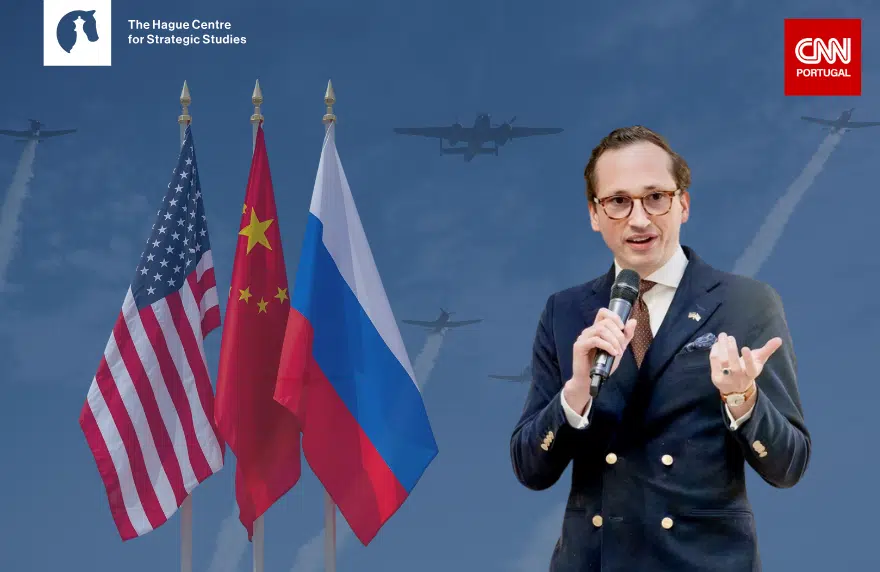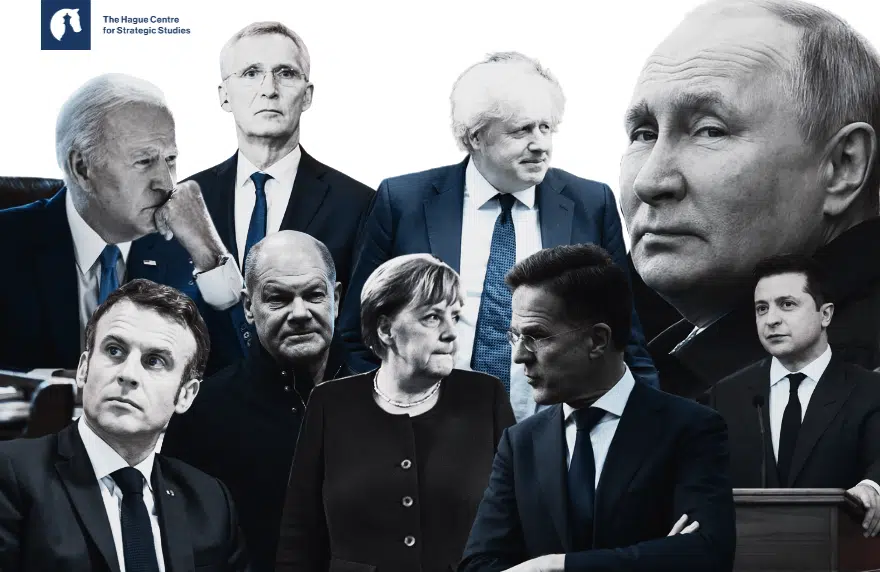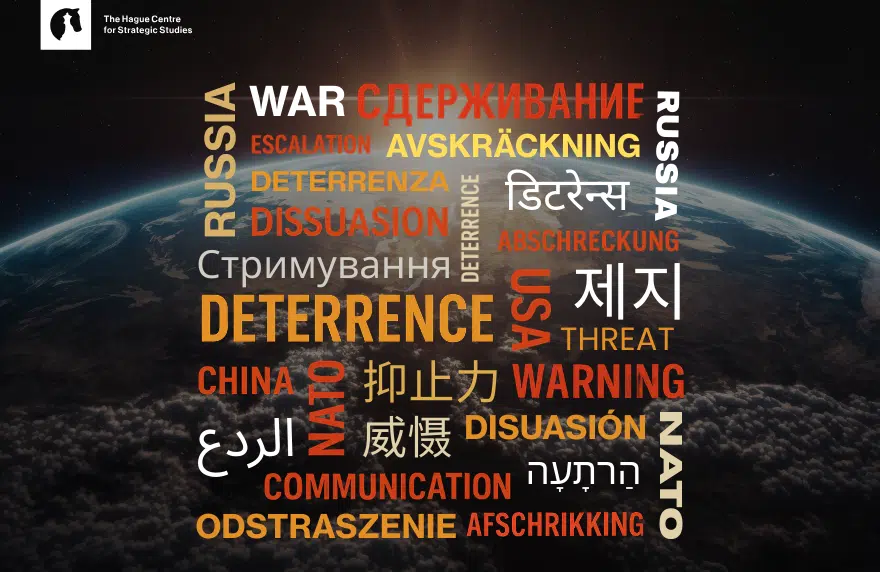“We must be cautious whenever we consider a Russian action irrational or improbable. Russia will do whatever we allow it to do.” – Markus Iven
INTERVIEW || Awarded the Dwight D. Eisenhower Prize by the Netherlands Atlantic Association for his thesis on the “Grand Strategy” of the United States and Russia, Markus Iven was in Lisbon at the invitation of the German embassy to speak about the “new European security architecture,” particularly in light of the US disengagement and Russia’s war in Ukraine. Speaking to CNN Portugal, the analyst from the Hague Centre for Strategic Studies discusses the real driving force behind Russia’s hybrid attacks on the EU and what we can expect in the near and not-so-near future, now that the US’s main direct competitor is China. “For those who believe that the next US government will once again prioritize NATO: that seems very unlikely,” he warns.
Starting with Donald Trump’s order for the Department of Defence to resume nuclear weapons testing , arguing that the US must be “on an equal footing” with Russia and China, how do you view this announcement and how does it relate to your thesis on Grand Strategy?
First of all, there is no confirmation that Russia and China are currently conducting new nuclear weapons tests. Recently, we have seen that arms control regimes such as the New START and the INF Treaty, which maintained global stability for decades, are deteriorating even further. This began with the non-renewal of arms control agreements between the US and Russia, but also with the rapid increase in the Chinese nuclear arsenal.
From a strategic point of view, it is possible to understand why Trump is now trying to pressure other nuclear powers with the announcement of potential new atomic tests. At the same time, this doesn’t make much sense in practice, since the United States’ nuclear arsenal is well-tested and its destructive force is not in question. From this perspective, the announcement can be interpreted as a signal: a way to persuade China and Russia to return to arms control negotiations. Trump has used this technique before in tariff negotiations, starting with a maximalist or provocative position to gain leverage before the negotiations.
So, in a way, do you consider it, above all, a show of force?
It’s a sign of determination. Signalling that the United States is willing to resume nuclear testing shows that it will not be deterred by Russia or China. In practice, it’s not very likely that the United States will actually go through with this anytime soon, but the simple act of signalling this willingness serves as a message in itself. It’s still only the first phase of nuclear negotiations: the signalling phase. The next step could be a negotiation phase or, of course, a nuclear test.
Earlier this week, at the seminar you attended here in Lisbon, you argued that the Trump administration should be seen “more as a symptom than the reason” explaining the current geopolitical order. In what sense?
The tectonic plates of global power have begun to shift again. From a bipolar system during the Cold War, we moved to a unipolar system dominated by the United States. But now the world order is changing once more, mainly due to the rise of China. It is in this sense that we can say that the Trump administration’s policies are merely a symptom, not the cause.
This means that future US governments, whether Democratic or Republican, are unlikely to change their basic policy towards China or Europe. And strategically, this makes sense, because only China has the economic base, the nuclear arsenal, and the conventional forces to become a hegemonic power in Asia and, through that position, a long-term threat to the United States. Therefore, for those who believe that the next US government will return to prioritizing NATO: this seems very unlikely.
You are not the only expert to defend this view; most experts consider China to be the only country capable of altering the global order. In this sense, how do you assess this week’s meeting between Donald Trump and Xi Jinping?
This week’s meeting between Trump and Xi revealed something important for Europeans. When Trump met with Xi in South Korea, many in Europe expected him to pressure Xi to reduce Chinese purchases of Russian oil, which remain crucial to financing Russia’s war effort. But, at the end of the meeting, Trump acknowledged that they hadn’t really discussed the oil issue. Instead, it was more of a transactional exchange focused on reducing US tariffs on China and restoring access to rare earths that had been restricted by Beijing. So, what we see again is that when US interests are at stake, European security is simply absent from the agenda, and that’s something that should concern us.
In this context, this is also quite aligned with the Chinese government’s position that “Putin cannot lose the war in Ukraine,” as a Chinese official admitted a few months ago. With less than a month to go before the deadline set by Trump to impose sanctions on Russia’s public and private oil companies – and considering what you also stated here in Lisbon, saying that it’s an illusion to believe that Russia is on the verge of economic collapse – do you think these American sanctions can change that? And do you think these sanctions will actually go ahead?
What we are already seeing is that about a third of Russia’s federal budget is being spent directly or indirectly on the war in Ukraine. This is very significant. Many expected the Russian economy to collapse quickly, especially at the start of the war, but this did not happen. Russia’s GDP even grew slightly this year, driven by arms production and very high public spending.
At the same time, the new US sanctions against Russian oil exports may be the most effective measures we have seen in a long time. They freeze all assets of Rosneft and Lukoil under US jurisdiction, prohibit any transactions by American citizens, and threaten foreign banks or companies with secondary sanctions if they continue to do business with them.
Targeting Rosneft and Lukoil is one of the best pressure points the West still has against Russia, because energy exports now account for more than 40% of Russian state revenue. Together, these two companies produce about 5% of global oil production, so hitting them with US sanctions is significant. This directly impacts the flow of money that finances the war.
Some analysts believe that these sanctions could actually have a greater impact on Europe, given that many European countries are still buying Russian oil, which basically means that we have been financing Russia’s war machine against ourselves, to our own detriment. Do you agree? How would Europe be affected by these sanctions against Russia?
Europe has effectively decoupled itself from Russian energy to a large extent after the 2022 war, when nobody thought that would be possible. The Russians even used this as propaganda to say that Europeans would freeze in the winter, and we didn’t see any of that happen. Therefore, I think it’s very unlikely that the latest sanctions on Russian oil will substantially harm us here in Europe.
Before the war, about half of Europe’s gas and roughly a quarter of its oil came from Russia. Today, Russian oil imports have fallen by more than 90%. The largest consumers of Russian oil are now China and India, which together buy about 80% of Russia’s crude oil exports. Therefore, only a few markets in Europe, such as Hungary and Slovakia, still depend on these supplies and may now come under pressure.
Speaking of the threats that Europe truly faces in the short and medium term: you seem to belong to the group of people who believe that we are not facing a question of “if” but rather “when” Europe will face direct attacks from Russia, at a time when we are already grappling with hybrid attacks. Based on your experience, what do you think will happen in the next five years? And in that context, do you think we are on the right track to be better prepared to deal with direct aggression from Russia than we were in 2022?
Yes, we have seen that the European Union, through the new SAFE program – which provides up to around €150 billion in low-interest loans to help Member States acquire the military capabilities needed to achieve the individual targets set by NATO – is beginning to act as a more serious player in security matters.
At the same time, we have witnessed a clear increase in hybrid attacks against us. Hybrid attacks are generally the strategy of the weaker side; that is basic strategic logic. The logic of the Russians is that states confronted with attacks against their critical infrastructure or their airspace will naturally prioritize their national defence. Therefore, the real reason why Russia is increasingly involved in these hybrid attacks is because it wants to divert European attention and resources from the war in Ukraine. And they have a structural advantage here.
How?
At a time when European nations are being attacked with cheap drones costing only $20,000, or carrying out low-cost underwater sabotage such as cutting cables, Europeans need to increase their resilience. But resilience can never be perfect. It is not possible to defend ourselves against all potential threats.
Therefore, the most important thing for Europeans now is to understand Russian logic. In fact, one of the best deterrent measures would be to declare that for every Russian hybrid attack on European soil, we would automatically increase our aid to Ukraine. The moment we did that, it would become strategically irrational for them to continue with these attacks.
Assuming this doesn’t happen, and considering reports from the intelligence services of some EU Member States stating that Russia may launch direct attacks against European territory in the next five years, particularly against the Baltic and eastern flank countries, do you think Russia will be more inclined to maintain this strategy of hybrid attacks to exhaust us and divert our attention from Ukraine? Or would you say there is a real possibility of direct attacks from Russia in the coming years?
We should be cautious whenever we consider a Russian action irrational or improbable. Both politicians and analysts stated the same before 2014, when Russia annexed Crimea, and again before 2022, when few believed it would launch a full-scale invasion of Ukraine, but that is what happened.
Now, once again, people are saying, ‘Isn’t it completely unrealistic that the Russians would attack a NATO country? Why would they do that?’ The best answer is that Russia will do whatever we allow it to do. It will always identify vulnerabilities and exploit them.
It is important to note that in the Baltic States, for example, we have a total population of only about six million, compared to over 140 million in Russia. And Russia has never stopped its mandatory military conscription, so it would be able to mobilize, if it really wanted to, a huge force, currently with about 1.5 million active soldiers and up to two million reservists. Although warfare is becoming more automated, in the foreseeable future we will still need people to operate drones and crew tanks, ships, and aircraft. Therefore, geography and demographics result in a structural vulnerability on Europe’s eastern flank.
Given this imbalance, it is crucial that NATO countries become more directly involved militarily on the Eastern Front, because a soldier located somewhere in Germany, France, or Portugal would have great difficulty reaching the location where they are truly needed in time. This is especially relevant for Western and Southern European countries. We need to invest in forward defence to make it clear, militarily and psychologically, to Moscow that attacking an ally would be an impossible task: a concept known as deterrence by denial. And even then, they would continue with their hybrid attacks. The only time these hybrid attacks would cease would be when the war in Ukraine came to an end.
The EU has been in intense discussions lately about this “drone wall” to counter Russian threats. Does this align with your position? What is your view on this strategy?
The concept of a ‘drone wall’ has a weakness: once built in one location, the Russians will find another weakness in European defences elsewhere. Therefore, building a static drone barrier from Norway to the Black Sea is, at the very least, extremely expensive and probably an impossible task.
So, instead of thinking about how we can perfectly prevent any intrusion into NATO airspace, it’s better to ask how we can alter Russia’s decision-making calculation. For every intrusion into NATO airspace, we could respond by imposing costs that outweigh the gains for Russia. The most effective cost Europe could impose is to intensify its support for Ukraine, because that’s where Russia is losing resources and manpower. Russia probably already has over a million soldiers killed or wounded. This also makes it clear that Ukraine is not only fighting for its own freedom and dignity but is also the first line of defence for Europe.
In one of your articles , entitled “Why the US, Russia and other great powers wage war,” he cites at one point John Mearsheimer’s offensive realism, according to which “no state can be certain of what others will do in the future, even if they currently act peacefully.” This is directly related to what we have been discussing, and I wonder: how does what is happening in Europe also relate to your thesis of Grand Strategy?
So, what we did in this research was analyse 38 wars fought by the United States and Russia since 1945, not just how they were fought, but why. And what really stands out is that the type of world order changes the logic of war. During the Cold War, the goal was to keep friendly regimes alive. In the unipolar years that followed, the United States waged wars of coercion and regime change. And now, with the rise of China, we are probably returning to a bipolar world, where the survival of regimes and spheres of influence are once again the main objectives.
The reason behind this is actually quite simple. States are never absolutely certain about each other’s intentions. A country that is a friend today may seem very different tomorrow, so everyone accumulates power simply for security, and this makes others feel less secure. In academic literature, this would be called a security dilemma. That is why, in the long term, European security will again depend on arms control and détente, also with Russia, to find some kind of stable coexistence.
The positive conclusion is that, if we understand these patterns, we can manage competition between great powers, even in places like the Indo-Pacific, without it escalating into direct war.





